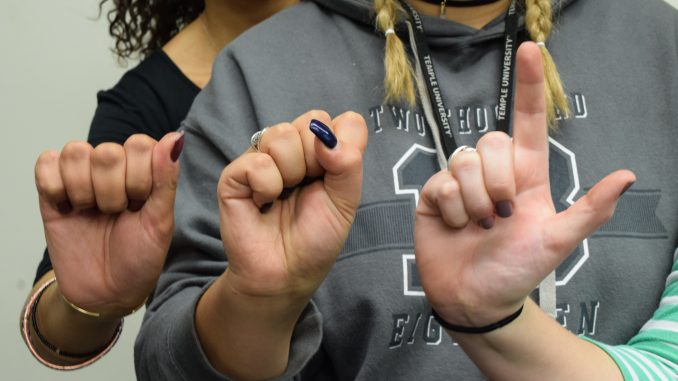
In this classroom, the lesson can’t be recorded on paper. Instead, American Sign Language instructor Meghan Rainone gestures in the air in front of her, her face and hands negating the need for speech.
The ASL program in the College of Public Health has grown from offering one basic course in 2013 to nine last semester. The courses are already exceeding capacity, and the program is looking to expand, both by adding more classes and teaching new material.
The department is considering adding a course about deaf culture, which “centers on the use of ASL and identification and unity with other people who are deaf,” according to the Laurent Clerc National Deaf Education Center at Gallaudet University. Rainone added that she hopes to develop ASL courses specifically catered to future careers, mainly in the healthcare industry.
“[Teaching ASL] without that in-depth culture, it’s almost impossible to get the full scope,” Rainone said. “They both go hand-in-hand.”
Rainone said the reception of the program has been wonderful, but the program needs more instructors and classroom space that’s large enough for students to be able to see their classmates and teachers sign at the same time.
Students who complete the ASL courses, levels one through four, receive an American Sign Language Certificate that shows “competence in expressive and receptive language skills as well as knowledge of Deaf Culture,” according to the program’s website. Rainone added that Temple is considering a partnership with the Community College of Philadelphia’s interpreter training program.

Rainone said she also hopes to work with North Philadelphia residents to expand ASL and deaf culture education.
ASL instructor Jonathan Hartmann said Temple is collaborating with the Deaf-Hearing Communication Centre, a nonprofit that serves as a primary resource for deaf education and advocacy in the tri-state area, to have deaf events on Main Campus.
He added that he will put in whatever work it requires to continue the growth of the program.
“We … have big hearts,” Hartmann said. “We’re willing to make compromises for the students.”
Shelby Northup, a senior speech, language and hearing science major, said she would have been at a disadvantage without basic ASL communication skills going into audiology, the branch of medicine concerning hearing, as a career.
“I will come in contact with clients in the future who use ASL,” Northup said. “That’s everything, their whole life … I’m not just in a language course. I’m gaining a life skill.”
Students are completely immersed in the language courses since two of the professors are deaf, Northup said.
“If you have a question, you have to say it in ASL,” Northup said. “Having to sign with my teachers has made me more comfortable taking the courses.”
Erica Wiler, a senior speech, language and hearing science major, is the president of Talking Hands, Temple’s ASL club. The club is open to signers with different levels of experience, and it allows them to practice their language skills through events like silent dinners.
She said the club is a great way for students to practice ASL outside the classroom.
“It’s opened up my eyes to a whole different world,” Wiler said. “You have to completely shut down every single thing that you know about language. … You’re using different motor systems completely.”
Although excited by the program’s growth, Rainone said she’s not surprised.
“Most of the [students] say that it’s a beautiful language … and it’s just different, completely different, than spoken language,” she said.
Ruth Oshlag can be reached at ruth.oshlag@temple.edu.


Be the first to comment